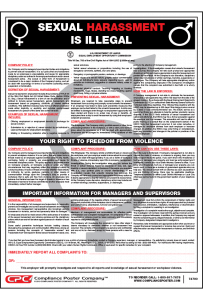 On August 29, 2018, Delaware Governor John Carney signed a bill expanding employer responsibility to prevent and correct sexual harassment in the workplace. HB 360 explicitly defines prohibited sexual harassment in the context of employment, provides information on when an employer is considered responsible for prohibited conduct by an employee or supervisors, and requires employers to provide sexual harassment training.
On August 29, 2018, Delaware Governor John Carney signed a bill expanding employer responsibility to prevent and correct sexual harassment in the workplace. HB 360 explicitly defines prohibited sexual harassment in the context of employment, provides information on when an employer is considered responsible for prohibited conduct by an employee or supervisors, and requires employers to provide sexual harassment training.
The new Delaware sexual harassment law will go into effect on January 1, 2019, although some training and education activities do not need to be completed until a later date.
What Is Sexual Harassment?
 Under existing state law, employers with four or more employees are prohibited from discriminating against an employee “because of” the employee’s sex. Under federal and state law, sexual harassment is understood as a form of sex discrimination and prohibited as such. Federal regulation 29 C.F.R. 1604.11 discusses the conditions under which behavior such as “unwelcome sexual advances, requests for sexual favors, and other verbal or physical conduct” may be considered prohibited sexual harassment.
Under existing state law, employers with four or more employees are prohibited from discriminating against an employee “because of” the employee’s sex. Under federal and state law, sexual harassment is understood as a form of sex discrimination and prohibited as such. Federal regulation 29 C.F.R. 1604.11 discusses the conditions under which behavior such as “unwelcome sexual advances, requests for sexual favors, and other verbal or physical conduct” may be considered prohibited sexual harassment.
Delaware’s HB360 embeds the definition of sexual harassment into explicit law. The new law borrows many of the the terms and conditions of the federal regulation and additionally specifies that sexual harassment “does not need to be motivated by sexual desire.” Sexual harassment directed at an employee is an unlawful employment practice when:
(1) submission to such conduct is made either explicitly or implicitly a term or condition of an individual’s employment;
(2) submission to or rejection of such conduct by an individual is used as the basis for employment decisions affecting such individual; or
(3) such conduct has the purpose or effect of unreasonably interfering with an individual’s work performance or creating an intimidating, hostile or offensive working environment.
Under this section of the law, “employee” means an individual employed by an employer and includes “unpaid interns, applicants, joint employees and apprentices.”
Delaware Sexual Harassment Law: Employer Liability
The new law also explicitly lays out the circumstances under which an employer may be considered liable for acts of sexual harassment committed against an employee by a supervisor or another employee:
- The employer is considered responsible for sexual harassment by a supervisor when the supervisor’s sexual harassment results in a negative employment action towards an employee.
- The employer is considered responsible for sexual harassment by a non-supervisory employee if the employer “knew or should have known” of prohibited conduct and failed to take “appropriate corrective measures.”
The employer is also considered responsible for the sexual harassment of an employee in any case where the employee experiences retaliation for the employee’s filing a discrimination charge, participating in sexual harassment investigation, or testifying in any proceeding or lawsuit about the sexual harassment of an employee.
Delaware Sexual Harassment Law: Notice Requirements
Employers have additional responsibilities to ensure that employees are informed of their rights and responsibilities under the law.
All employers covered by the law must provide employees with an information sheet on sexual harassment created by the Delaware Department of Labor. The information sheet may be distributed physically or electronically, and must be delivered to new employees at commencement of employment and to existing employees by July 1, 2019. Employers can download or print the mandatory information sheet here or from CPC’s Free Labor Law Postings page.
The law specifies that a claim that an individual employee did not receive the information sheet does not in and of itself result in employer liability for sexual harassment reported by the individual; however, an employer’s compliance with the notice requirement also does not insulate the employer from liability for sexual harassment of an employee.
Delaware Sexual Harassment Law: Training Requirements
 Employers with 50 or more employees are required to provide sexual harassment prevention training to both employees and supervisors. (For counting purposes, employees do not need to include applicants, independent contractors, or employees placed by an employment agency. Employers are also not required to providing training to applicants, independent contractors, or employees who have been employed less than 6 continuous months.)
Employers with 50 or more employees are required to provide sexual harassment prevention training to both employees and supervisors. (For counting purposes, employees do not need to include applicants, independent contractors, or employees placed by an employment agency. Employers are also not required to providing training to applicants, independent contractors, or employees who have been employed less than 6 continuous months.)
Employees must receive interactive training and education every two years, with the first instance occurring within 1 year of the commencement of employment for new employees and by January 1, 2020 for existing employees.
Employee training must cover the following topics:
- The illegality of sexual harassment;
- The definition of sexual harassment, using examples;
- The legal remedies and complaint process available to the employee;
- Directions on how to contact the Delaware Department of Labor; and
- The legal prohibitions against retaliation.
In addition to the training available to all employees, supervisors must receive additional interactive training regarding the specific responsibilities of a supervisor to prevent and correct sexual harassment and the legal prohibitions against retaliation. Supervisors must receive this additional training every two years, with the first instance occurring within one year of commencement of employment for new supervisors and by January 1, 2020 for existing supervisors.
The new Delaware sexual harassment law goes into effect on January 1, 2019. If an employer has provided training to employees or supervisors prior to January 1, 2019 which conforms to the requirements of the new law, no additional training is required until January 1, 2020.
Delaware Sexual Harassment Law: What Else Do Employers Need to Know?
The Delaware Department of Labor will post the training requirements on their website and provide outreach to ensure that employers understand their rights and responsibilities under the new law. Employers may also wish to review the policy guidance documents related to sexual harassment released by the federal Equal Employment Opportunity Commission (EEOC).
Employers can reinforce sexual harassment training and ensure workers know their rights and responsibilities by posting the Sexual Harassment is Illegal Poster in the workplace. This poster provides information on prohibited conduct and includes a fill-in section so that employees are informed of how to report sexual harassment in the workplace.
KEEP IN TOUCH WITH CPC!
To keep up with the latest in labor law news and posting compliance, follow us on Facebook, LinkedIn, or Twitter or subscribe to this blog! You can also contact us by phone, email, or chat to order one of CPC’s signature labor law compliance products or learn more about your company’s individualized posting obligations.
Please keep in mind that CPC is unable to provide legal advice.

